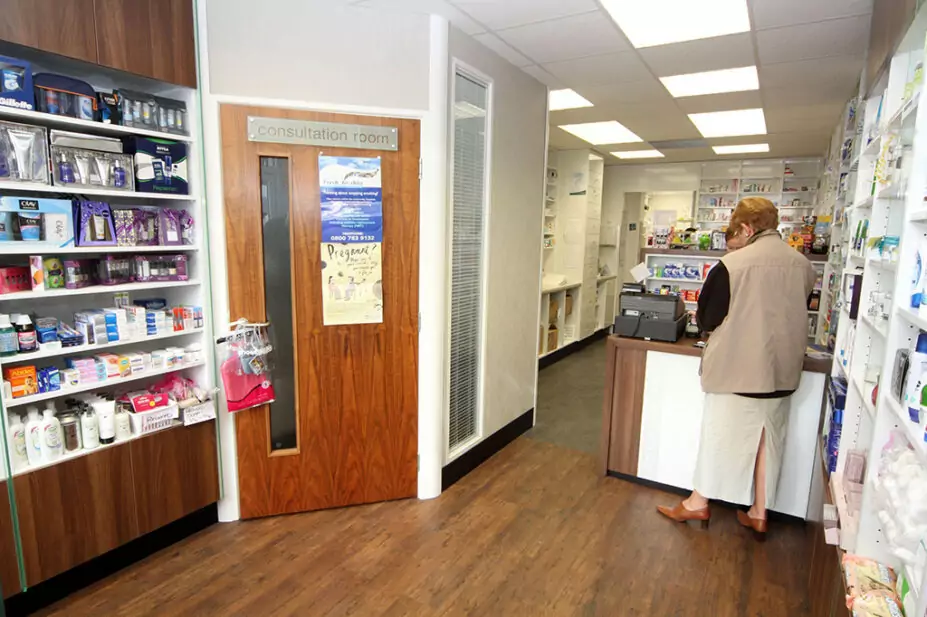
Alister Firth / Alamy Stock Photo
A ‘Pharmacy First’ common ailments service could be commissioned in England from the end of October 2023, the National Institute for Health and Care Research (NIHR) has said, as it announced plans to commission research on the effects of such a scheme.
The UK government’s health and social care research arm published the plans on its website in April 2023, saying that it expects to issue “a call for research” on 27 April 2023 that is designed to evaluate a ‘Pharmacy First’ service, particularly “considering [its] implications for antimicrobial resistance”.
The announcement adds that the research should focus “on understanding the impact, safety, cost effectiveness and acceptability of an expanded service to treat common conditions in community pharmacy”.
“The ‘Health and Social Care Delivery Research’ (HSDR) programme is looking to commission a research team to carry out an evaluation, alongside the potential roll out of this common conditions service in England,” the website says.
“Subject to successful commissioning, this service will commence no earlier than the end of October 2023.”
Former health secretary Sajid Javid first floated the idea of setting up a national minor ailments service in October 2021.
However, following the announcement of an agreement on the final two years of the current community pharmacy contract in September 2022, plans for a similar service in England appeared to have been shelved.
Then, on 31 January 2023, Barclay told the House of Commons Health and Social Care Select Committee that there is “strong agreement” between the government and the Pharmaceutical Services Negotiating Committee (PSNC) on setting up a ‘Pharmacy First’ service but added that the government needs “to look at the financing of that”.
But, as of 14 April 2023, the PSNC told The Pharmaceutical Journal that it was still waiting for confirmation from the government on whether the Pharmacy First service would go ahead.
Janet Morrison, chief executive of the PSNC, said: “[The] PSNC is still awaiting news from government on whether a Pharmacy First service, which we proposed to them in March 2022, will be commissioned as part of the Primary Care Recovery Plan.
“We strongly believe such a service would be a key solution to help improve patient access to the NHS and to support our colleagues in general practice, whilst also being the best chance to get significant additional funds into community pharmacy.”
On 17 April 2023, a spokesperson for the NIHR told The Pharmaceutical Journal that the notice on its website is “a pre-call alert” that “does not guarantee a call will be advertised”.
“However, it is likely that if a call were to be advertised, there would be a need for scoping and mapping of activity and services, and the call will not be limited to activity in England,” they said.
The NHS ‘Pharmacy First’ service launched in Scotland in July 2020, offering patients the opportunity to visit a pharmacist as their first port of call for minor illnesses, such as urinary tract infections, impetigo and acne.
The NIHR spokesperson added: “The NIHR HSDR programme funds national evaluations of complex service change programmes, looking at elements such as changes in ways of working, implications for the workforce, acceptability, health inequalities and access to services.”
Commenting on the call for research, Neil Powell, consultant antimicrobial pharmacist at Royal Cornwall Hospital, said: “There is [a need for research] because we need to see whether pharmacists have got appropriate skills and resource — as in time — to do this. And then the question is, can pharmacist deliver it in a way that there’s less overuse.”
He added: “The big question is about appropriateness of antibiotic prescribing. Are pharmacists able to prescribe antibiotics appropriately to people with common respiratory infections, with lower UTI infections? We know from research that overprescribing antibiotics for respiratory infections is common.
“There’s lots of reasons for that: patient expectation, patient through-put – trying to get as many patients seen as possible — to how tired the prescriber is feeling. If we’re going to devolve this further to pharmacists then we need to also do some work looking at the overprescribing of antibiotics by pharmacists in the community setting. Are there the same issues, or are pharmacists better placed to do it?”


